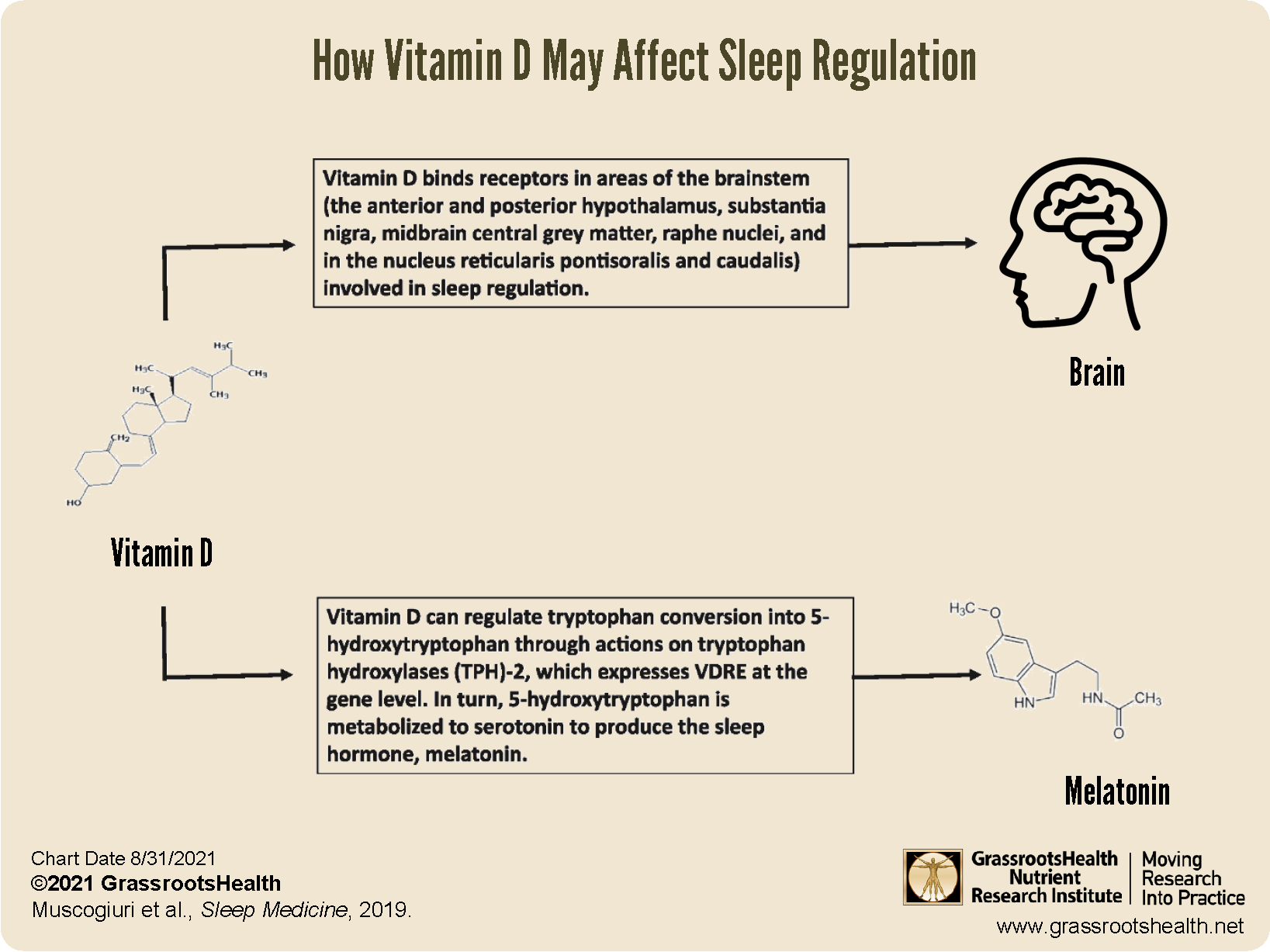Published on July 8, 2022
Studies find benefit of vitamin D and several other key nutrients in sleep regulation and quality of sleep
Key Points
- Lack of sleep can be attributed to many factors, however, for individuals struggling with falling asleep and staying asleep, research has shown certain nutrients, such as vitamin D, magnesium, melatonin, and omega-3s, to be helpful
- A meta-analysis of 31 randomized controlled trials looked to see which dietary supplements had the strongest relationship to quality of sleep and found significant improvement among those supplementing with amino acids, melatonin, and vitamin D
- A separate review found a correlation between lower vitamin D levels and poor quality sleep and/or shorter sleep duration, and explains the role vitamin D plays in the synthesis of melatonin
 How well we sleep can directly affect our overall health, and a consistent lack of sleep can contribute to the development and progression of chronic health diseases. According to the Centers for Disease Control and Prevention (CDC), insufficient sleep has been linked to conditions such as type 2 diabetes, cardiovascular disease, obesity, and depression.
How well we sleep can directly affect our overall health, and a consistent lack of sleep can contribute to the development and progression of chronic health diseases. According to the Centers for Disease Control and Prevention (CDC), insufficient sleep has been linked to conditions such as type 2 diabetes, cardiovascular disease, obesity, and depression.
Lack of sleep can be attributed to many factors, however, for individuals struggling with falling asleep and staying asleep, research has shown certain nutrients to be helpful.
Findings from Meta-Analysis on Supplements and Sleep
A recent systematic review and meta-analysis by Chan, V. and Lo, K. looked at data from 31 randomized controlled trials to see which dietary supplements had the strongest relationship to quality of sleep. The authors found that sleep quality was significantly improved among those supplementing with amino acids, melatonin, and vitamin D.
Other supplements mentioned by the study authors that show promise for improving sleep quality include magnesium, zinc, resveratrol, and nitrate. In fact, some research investigating magnesium supplementation and sleep has shown significant improvements in insomnia severity, sleep time, sleep efficiency, sleep onset latency, and the regulation of sleep related hormones. Magnesium supplementation has also been shown to decrease periodic limb movements during sleep.
How Might Vitamin D Affect Sleep?
Another review by Muscogiuri et al. looked specifically at observational studies and clinical trials involving vitamin D and sleep. The majority found a correlation between lower vitamin D levels and poor quality sleep and/or shorter sleep duration.
The authors went on to look into the mechanisms by which vitamin D could have such an effect on sleep. They describe vitamin D receptors in the areas of the brain responsible for sleep regulation, namely those parts of the brain important for the first stage of sleep and for maintaining sleep.
The authors also describe the role vitamin D plays in the synthesis of melatonin. Melatonin, known as the “Sleep Hormone,” is secreted from the pineal gland and plays a role in controlling sleep and the circadian rhythm. Sunlight drives both vitamin D synthesis and the synthesis of melatonin, and there is evidence that vitamin D itself may help regulate the production of melatonin, as described in the diagram above.
Getting Enough Nutrients to Support Your Sleep
Based on the findings presented above, knowing your levels of vitamin D, magnesium, and zinc may help determine if more of these nutrients might be needed to support healthy sleep. Omega-3 fatty acids may also be an important measurement, since a study covered recently showed how supplementing with both vitamin D and omega-3s resulted in the greatest improvements in sleep, as well as better overall mood.
See if your nutrient status could improve to support better sleep. Create your custom home blood spot kit with the following measurements to help determine if you are getting enough of the following nutrients shown to benefit sleep:
- Vitamin D
- Omega-3 Index
- Magnesium Plus Elements
Having and maintaining healthy vitamin D levels and other nutrient levels can help improve your health now and for your future. Enroll and test your levels today, learn what steps to take to improve your status of vitamin D (see below) and other nutrients and blood markers, and take action! By enrolling in the GrassrootsHealth projects, you are not only contributing valuable information to everyone, you are also gaining knowledge about how you could improve your own health through measuring and tracking your nutrient status, and educating yourself on how to improve it.








